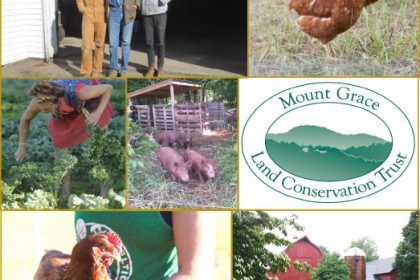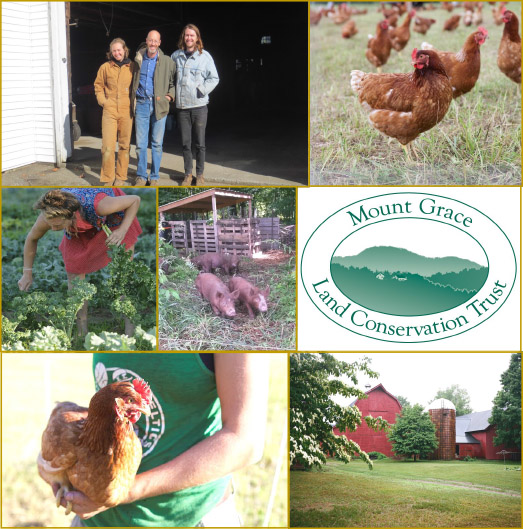
 Friends and supporters of local farming gathered in Hinsdale, New Hampshire this harvest season to celebrate the permanent protection of Wingate Farm.
Friends and supporters of local farming gathered in Hinsdale, New Hampshire this harvest season to celebrate the permanent protection of Wingate Farm.
Olivia Pettengill, the new owner of the Farm, in partnership with her brother James, began the celebration by thanking the groups who worked together to conserve the farm: “We are incredibly fortunate to have access to this prime farmland and to have so many dedicated people help us protect our family farm, and we are grateful to have such a supportive and inspirational farming community around us.”
Olivia and James are the fifth generation of Pettengills on Wingate Farm, which is operated by Olivia and her business partner, Susan Parke-Sutherland. In their second season growing they raise 700 pastured laying hens, hundreds of broiler chickens, eight forest-raised pigs, and a variety of vegetables and flowers. The laying hen operation began with the guidance of neighboring Picadilly Farm, and Wingate eggs are featured in CSA shares for Picadilly Farm and Red Fire Farm, in Montague, Massachusetts, and are sold in local co-ops. Wingate Farm’s organically grown produce and flowers are sold at farmers markets year round. “It is an honor to have support from such remarkably established and dedicated farmers, and from the surrounding communities that they have brought together with local food,” added Olivia. “We try to grow food by paying close attention to the most basic natural systems on our land. We are constantly learning and striving to build the health of our animals and our land.”
Wingate Farm covers nearly 60 acres in the towns of Hinsdale and Winchester, New Hampshire and, until recently, was jointly owned by sisters Carroll Pettengill and Alma Niemiller. In addition to transferring the land to the younger generation, the family conveyed an agricultural conservation easement to Mount Grace Land Conservation Trust. Language in the easement prevents the land from ever being split apart from the house and barns—protecting the whole farm.
An option to purchase at agricultural value (OPAV) has also been placed on the land. These options are increasingly used to guarantee that protected farms stay in agricultural production and in the hands of working farmers. The option allows Mount Grace to ensure that a sale of the farm would be to a farmer at agricultural value. This is the first time an OPAV has been used to protect farmland in New Hampshire. Without this tool, farmers will continue—as is happening across the country—to get outbid by non-farmers, taking irreplaceable land out of farm production. “The conservation of Wingate Farm used farm protection models that are novel to New Hampshire,” explained Ian McSweeney, Director of the Russell Foundation. “The family’s goals and Mount Grace’s deep commitment to conserve the farm and support the community has created a model project that has conserved the land, addressed active farming and farmland affordability and supported the farm business development of the property. Wingate Farm now stands as a model of innovation in New Hampshire’s farmland conservation”
The farm has been protected with support from the USDA Agricultural Conservation Easement Program, the New Hampshire Land and Community Heritage Investment Program (LCHIP), The Russell Farm and Forest Conservation Foundation, the Tortuga Foundation, the Bromley Charitable Trust, the 1772 Foundation, and the Conservation Commissions in Hinsdale and Winchester, New Hampshire.
Winchester Conservation Commission member John Hann offered the Commission’s statement of support: “The Winchester Conservation Commission is excited about the possibility of protecting other farms in town. Farming is a valued, essential tradition. Our Master Plan states ‘Winchester wants to remain a rural community connected to its agricultural heritage, supportive of sustainable farming and wood lot management.’ An option to purchase at agricultural value is a new tool for modern farmers.”
“Throughout the process, everyone has been so supportive,” added Peter Pettengill, James and Olivia’s father. “What was most gratifying to me was the way that our local towns, Winchester and Hinsdale, stepped up and budgeted money to help fund the Conservation Easement at Wingate. I think they recognize that this kind of program benefits not just our family but the entire community. It’s a long range viewpoint that this will enhance the overall quality of life in both towns.”
This is Mount Grace’s first conservation project in New Hampshire. The trust has protected more than thirty farms and has been at the forefront of new strategies to help support local farms. “Simply protecting the land is not always enough to save our farms,” said Jamie Pottern, Farm Conservation Program Manager at Mount Grace. “By employing new tools like the OPAV, we can help our current and future farmers get on the land—this in turn helps towns protect their community heritage, increase food access, and strengthen rural economies.”
A version of this post originally appeared on Mount Grace’s website.
David Kotker is the Development Manager at Mount Grace Land Conservation Trust. He is responsible for coordinating membership events and activities and managing and expanding the volunteer program. He has worked in fundraising for nonprofit environmental and conservation groups for over ten years, including four years with Greenpeace and four with the Citizens Awareness Network.




